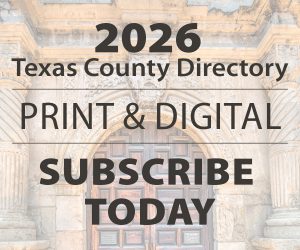By Julie Anderson, Editor
According to Business Insider, a U.S. business and technology website, during the second quarter of 2013, Facebook logged some 198 million monthly users on average, with Twitter recording 49 million monthly active users on average, all in the United States (http://www.businessinsider.com/).
- What does this mean to Texas county government? Are newspapers, television broadcasts and websites enough? If we pass on posting or tweeting, are we missing out?
- For the last several months, we contacted several of you to get your take, posing the following questions:
- Does your county or office use social media?
- What prompted you to give it a try?
- How has it helped?
- What are the pitfalls, and how do you navigate them?
- If you’ve opted to avoid social media, tell us why.
With your answers, we hoped to determine the following: How can we take advantage of the benefits (instant notification) while navigating the challenges (misinformation and misuse)?
 First, those who responded were most familiar with Facebook. While some had looked into Twitter and even started an account, most did not offer feedback on Twitter use, except to say they used it to keep informed rather than to inform others. In one notable exception, Hidalgo County touted Twitter as an effective communication tool.
First, those who responded were most familiar with Facebook. While some had looked into Twitter and even started an account, most did not offer feedback on Twitter use, except to say they used it to keep informed rather than to inform others. In one notable exception, Hidalgo County touted Twitter as an effective communication tool.
“Our Twitter account continues to grow in followers, and we find that Twitter is a great way to access traditional media networks (via individual reporters and stations), since they often retweet our tweets to their expansive networks,” said Karina Cardoza, director of public affairs for the office of Hidalgo County Judge Ramon Garcia (see full story, page 20).
When it came to Facebook, your responses were varied and thoughtful giving us insight into a process that has been generally rewarding to many, but challenging to others.
For example, Taylor County Judge Downing A. Bolls Jr. respectfully addressed the premise of our question, bolded above.
“That’s a great question,” Bolls acknowledged, “but it starts with an even bigger question: CAN we take advantage of the benefits while navigating the challenges? ‘Can we’ needs to be answered before we ask, ‘‘How can we?’ ”
While Bolls agreed that social media has the potential to be a “valuable tool and resource to inform the public,” the damage he has witnessed firsthand has led him to steer clear of the practice.
“It is generally the domain of people with an agenda who really aren’t seriously interested in what you have to say, but just want a platform for expressing their own thoughts and ideas,” Bolls insisted. “It’s sort of the 21st century version of standing on a soap box on the steps of the courthouse. What I typically see is about one minute of leveling criticism and accusation, and then the conversation erodes into personal attacks and morphs into a whole different discussion.”
Bolls went on to say that he welcomes new and exciting technological advances and the positive impact they have on society, “but I don’t think we’re there yet.
“I have personally seen the damage that can be done by angry people with an agenda and an ax to grind. They turn social media into weapons, and it can have disastrous results.”
Facebook has 1.3 billion users, and every 20 minutes 20 million people “Facebook” someone and ask them to be friends, Bolls declared. “The question is: Are they really your ‘friend?’ ”
Bolls cautioned public officials using social media to remember, “Anything you say can and may be used against you in a court of public opinion.”
Young County Judge John C. Bullock voiced concern over potential snares.
“I think that Facebook and other tools have their place and can be efficient and useful, but usually, in our circumstances, it is a platform for criticism and character assassination or braggadocios bloviating,” Bullock stated. “I do not personally monitor, post, or have accounts on these media, and I really don’t have the time to spend that way.”
Jack County Judge Mitchell G. Davenport also echoed Bolls when it comes to the pitfalls of social media.
“The main challenge I see is that anyone can say anything, and oftentimes there is no effort made to determine the accuracy of the statement; words uttered can never really be recalled,” he maintained.
However, Davenport believes counties can use social media as a corrective tool to address misinformation posted on social media and disseminated via other public forums.
“For a county, it affords a platform where we can correct those statements or even issue periodic statements of our own giving accurate information to the public,” Davenport emphasized. “I try to correct what I hear or publish my own statements offering correct information, in some cases getting ahead of the curve on ‘coffee shop talk.’ ”
Davenport set up Facebook pages for both Jack County and the county’s Emergency Management Department. He currently controls the content, but may eventually assign a portion of the maintenance to his secretary.
“Folks are going to talk anyway,” he concluded. “You may as well give them the correct story to work with.”
Cherokee County Commissioner Kelly Traylor launched his Facebook page in January 2012 as part of his re-election campaign. After winning his second term, he transformed the page, titled Precinct 1 Commissioner Kelly Traylor, into an information portal and two-way communication tool.
For example, one “conversation” was launched by a taxpayer who asked Traylor via Facebook, “Can you work on (Road) 1616?” Traylor responded on his page within 40 minutes of the inquiry with the following: “Yes, madam. What are your concerns? Potholes? We peeled the edges so the water will get off and have plans to resurface it in the near future like we did one end last summer.”
In fact, many of Traylor’s postings involve roads, with shared information addressing closures, working areas, and photos of damages and repair efforts. For instance, along with the photo on page 13, Traylor commented: “Slowly we are getting the roads back in shape. One by one.”
“I have received mostly positive feedback from my audience,” Traylor reported. Since launching the page, only one person has posted an inappropriate comment. Traylor did not respond via Facebook, but called the writer of the offensive comment directly.
When an official establishes a Facebook page and allows viewers to engage, it is important for the official to follow up when necessary, Traylor proposed, taking the required time to provide a thorough and thoughtful response to inquiries.
In addition to current county events, Traylor uses his Facebook page to let his constituents know that he is pursuing his required education. While attending the recent V.G. Young Institute School for County Commissioners Courts, Traylor logged the following message: “Bringing some great ideas back to Cherokee County from the educational conference in College Station.”
Interestingly, it was an educational conference class on county technology that first piqued the interest of former Houston County Judge Lonnie Hunt.
“I was a relatively new Facebook user, and based on the presentation I thought a county Facebook page could be an innovative tool to inform our citizens about the activities of their county government,” Hunt explained. He returned home from the conference and launched the Houston County Facebook page the next day, May 20, 2010.
“County government belongs to the people. It functions best when citizens are supportive and involved,” Hunt elaborated. “Keeping citizens informed is the key to getting them involved. In today’s fast-paced world, that can be a challenge using traditional methods. But through the use of social media tools such as Facebook, it can be accomplished with a small amount of effort and virtually no cost.”
The “beauty” of having a county Facebook page is that “it is simple to develop, takes very little time, and it is absolutely free,” Hunt recounted. In fact, Hunt created and launched the Houston County page “while sitting in my recliner at home, using my laptop computer.” The process – from creation to the first post – took about one hour.
Hunt would go on to serve as County Judge through December 2011, during which time his experience with Facebook was overwhelmingly positive.
While pages can be designed “for view only” without the option to reply, Hunt fashioned the Houston County page to allow for feedback. The public could not post a new topic on the page, but was allowed to post a reply to an existing topic. The vast number of public posts were very positive. Twice in the 19 months that he managed the county page, Hunt removed posts from responders and then contacted the parties to explain why he deleted their entries. In both cases, he communicated to the users that their content was not applicable to the particular post, and in both incidences the exchange was congenial.
While Hunt is no longer County Judge, he remains connected to county government through his current job as county relations officer with the Texas Association of Counties, and he continues to monitor the Houston County Facebook page. When asked to share the impact of social media on his county, Hunt broke down his response into a list of objectives and corresponding results:
Increase awareness about the role county government plays in the lives of citizens. Within 10 days of launching the page, it had attracted more than 400 “friends.” Within a year, that number grew to about 900 and is currently over 1,900. To put this into perspective, the Census Bureau reports 7,883 households in Houston County, meaning 1,900 Facebook users represent about 24 percent of the total number of households.
Provide notices and reminders about Commissioners Court and other county meetings. The very first item that was posted on the page was a notice of an upcoming Commissioners Court meeting. These notices provide a link where citizens can click to view the agenda for the meeting. Other examples of information posted include election notices, list of polling locations, jury cancellations, and courthouse holiday closings.
Provide reports on Commissioners Court action. After each Commissioners Court meeting, I posted a “note” on the page which provided a summary of action taken.
Provide an additional opportunity to inform the public with emergency notifications and other public safety issues. When a winter storm hit Houston County in February 2011, citizens were able to keep informed of weather advisories via the county’s Facebook page. Notices were also posted regarding the closing of county offices. Red flag warnings and local burn bans are included in postings. This emergency information automatically pops up on the newsfeed of all Houston County Facebook friends. The number of Houston County followers skyrocketed when a large wildfire broke out in our county over Labor Day weekend in 2011. Our Facebook page really became a valuable emergency management tool at that time. We were able to provide information to citizens who lived or owned property in the fire zone, as well as the general public, who was understandably interested in what was going on. I believe by putting the information out on Facebook, we greatly reduced the number of people calling into our sheriff’s office to ask for updates over the phone. We also posted a need for people to loan us large ice coolers to get drinks and food out to the firefighters in the field. We asked them to bring the coolers to our local senior center, which we were using as a staging area for supplies. The response was so great (and so fast) that within a few minutes we had to post a message that we had plenty of coolers and to please quit bringing them.
Promote more transparency in county business. A good example of this is the posting of budget information, including a link to the county budget on the county’s official website. We also posted Commissioners Court agendas and notices of other public meetings.
The Houston County Facebook Page currently has over 1,900 friends or followers. However, the information presented on the site is seen by many more people. Facebook provides statistics to show how many people have viewed each item posted. Here are some examples:
- A record 3,938 people viewed a story about the death of longtime County Veterans Service officer W. G. Bradshaw.
- 3,483 people viewed a link to a report on an area television station about a new program the sheriff’s department implemented to help locate missing persons.
- 3,011 people viewed the agenda for a Commissioners Court meeting in July of 2010, and 2,996 people viewed a follow-up report on that meeting.
- 2,461 people viewed photos from a Congressional Town Hall Meeting held by Congressman Joe Barton at the Houston County Courthouse in August 2010.
- 2,613 people viewed a jury cancellation notice.
- 2,533 people viewed a job posting from the County Attorney’s Office.
- 1,782 people viewed a listing of county employees who received service awards at our 2010 Employee Appreciation Dinner.
Other benefits of the Facebook page include:
- Cost Savings: When juries are cancelled, the county still has to pay jurors who report for duty. By posting this information on the Facebook page, more citizens learn of jury cancellations and do not report, thus saving county tax dollars.
- Job Postings: By posting job openings on the Facebook page, county offices have reported that they receive many more applications from well-qualified individuals when job openings occur. Attracting the best-qualified persons to fill these positions provides better service to the public and long-term cost savings to the county
- Clearly, social media, particularly Facebook, has been put to good use by counties and county officials, providing a virtually cost-free forum for quick dissemination of not only good-news items, but emergency and public safety information. However, it is quite difficult to prevent the posting of inaccurate or inappropriate information by connected “friends.” As one County Judge indicated, once uttered, words are difficult to recall. When it comes to Facebook, these types of comments can be deleted by the page manager. Of course, this requires the county official or a designee to spend time monitoring the page. A negative comment left on a page indefinitely, or a damaging exchange of words allowed to continue too long, can be devastating, as another Judge noted.
Hidalgo County continually monitors their Facebook page and warns users via a disclaimer that comments may be deleted:
- As with all our social media sites, we hope that you will treat this forum with the same respect as you would if you were talking to your elected officials. This is an open forum and we respect rights to free speech and your right to disagree with your government; however, we do ask that you follow some basic rules of decorum.
- We ask that you keep your comments clean, respectful and related to county government. We do not allow graphic or obscene…comments that disparage any race, gender, ethnicity, sexual orientation, religion or ability. We do not allow any comments that are abusive, hateful or intended to defame anyone or any organization.
- We do not allow solicitations or advertisements. This includes promotion or endorsement of any financial, commercial, for-profit entity or elected official or candidate for office. We do not allow attempts to defame or defraud any of these groups either.
- We do not allow comments that suggest or encourage illegal activity.
- Failure to do abide by these guidelines may result in your comment or post being removed, and/or being banned…from this page. You participate at your own risk, taking personal responsibility for your comments, your username and any information provided. All comments posted (and deleted) are subject to disclosure under the Texas Open Records Act.
So what do you think? Are we able to simultaneously reap the benefits of Facebook while navigating the challenges? Are the rewards worth the potential risks? Please continue to send your comments to janderson@zacpubs.com, and per your permission we’ll share your thoughts on this site and on our County Progress Facebook page.













